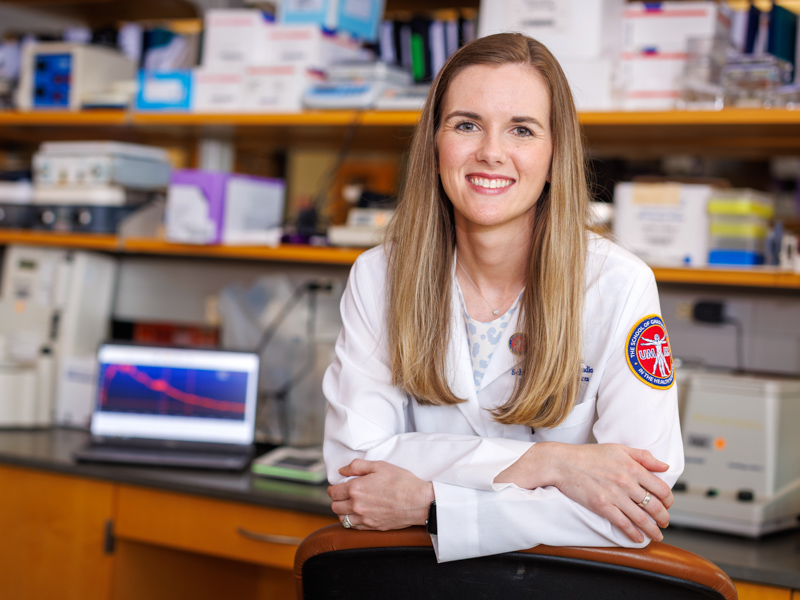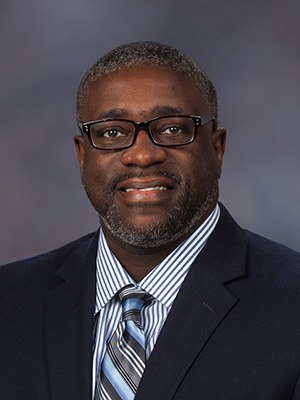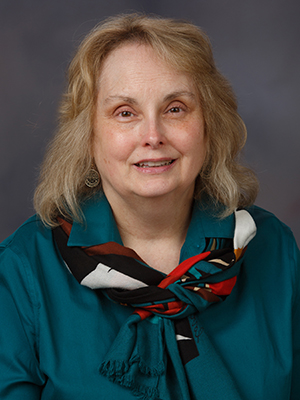#2025UMMCGrad: PhD student focuses on the interconnectedness of the body

When Jordan Mallette, 30, taught a course on renal physiology awhile back, she had memories of being a student in that very class once -- and now she’s teaching others. She realized these students, in turn, would grow to mentor and teach even younger students.
“It was a good experience, especially for my first time teaching physiology. But it was funny to be on the other end of the education process,” Mallette said. “I had to figure out how best to teach students so they learn and absorb the content, but also understand it.”
It’s a perpetuating cycle. Mallette observed how everything, and everyone, in education, work, play, family and life in general are symbiotic. She also has recognized such interconnectedness in the body during her studies at the University of Mississippi Medical Center.
A graduate student accepting her PhD in May, Mallette has been studying physiology and biophysics at the School of Graduate Studies in the Health Sciences. Mallette comes by her interest in physiology honestly, thanks to her dad. She is the daughter of Dr. Robert Hester, a professor in the Department of Physiology and Biophysics and current president of the American Physiological Society.
“I think the kidneys are often ignored more than other, bigger organs like the heart. People in general tend to think of the heart first as the most important organ in the body,” she said. “But the kidneys are just as important. The organs need each other. The heart, kidneys and endocrine and circulatory systems and others are individual, but they have to work together to keep a human body alive.
“In the body, everything interconnects, so you have to think of how disruption in one system may alter organ systems.”
She did find that one thing to focus on, however – the renal system. Why? “The kidneys are so important. It’s difficult for people to remember all the things they do for us. They regulate blood pressure, sodium content and a host of other elements, and they filter all the bad stuff out of our bodies, like alcohol, creatine, nitrogen waste, acids and other substances,” Mallette said.
“Basically, kidneys are like one big coffee filter for the body. Everything we eat goes through there and affects the rest of the systems. The kidneys are such a hidden thing. But they’re essential to the body. And we often don’t think about it until something goes wrong.”
In her renal studies, Mallette zoned in on how a shift in hormones may alter organ systems and increase risk. Next, she looked at aging and its effects, as well as injury caused by renal ischemia reperfusion. That is when there is a sudden temporary impairment of the blood flow to the organ, creating inflammation.
“Basically, we would clamp a kidney and stop the blood flow, then take the clamp out and start the flow again – mimicking an acute kidney injury with a test animal. Then we studied the outcomes and how to treat them,” Mallette said. “Some individuals may recover from an injury like that, but sometimes it’s severe enough that it causes a person to have chronic kidney issues.”
After earning her Bachelor of Science degree in biomedical engineering at Mississippi State University, Mallette moved on to obtain her Master of Business Administration at Millsaps College. It allowed the wedding of business and medical pursuits. When her own marriage occurred, the couple moved to Hattiesburg. There she took a break from college and began a job in health care working with electronic health records and researching patient data, including that regarding COVID and its treatment. Afterwards, she continued her educational pursuits at UMMC to pursue a higher degree. Her husband, Walton Mallette, works for UMMC as director of ambulatory operations in the Division of Dermatology.
“What I do is different from a medical doctor. I don’t see patients but primarily do research. And my next level will include a little more individual studies,” Mallette said. Now she’ll continue her studies, and some teaching, at UMMC as part of a post-doctoral fellowship. And she’ll have the freedom to pursue grants and submit papers. “UMMC’s program is just a little higher up and known for its research here,” she said.
UMMC and its research programs are on the cutting edge of what is offered across the United States, according to Mallette. “UMMC researchers, as well as off-campus professionals, present their findings once a week, and I’ve been able to mentor a NRSP medical student, Adrian Oudomrath Steyrer, after she volunteered for a research study,” she said. “She worked alongside me in doing a research study, and she is a med student too, graduating this year.”

According to Dr. Jan Michael Williams, Mallette was an exceptionally productive student in the Physiology Program. “She was actively engaged in mentoring and service activities at both the local and national levels,” Williams said.
One major asset Mallette has is Dr. Barbara Alexander, a UMMC professor of physiology and biophysics and Mallette’s mentor in many ways. “Jordan grew up as Dr. Hester’s daughter, and he is a Billy S. Guyton Distinguished Professor in physiology at UMMC,” Alexander said. “Thus, her interest in the topic started at a young age. All of her studies, degrees and professional medical work progressions were a part of her long-term career goal,” she said.

“Jordan is an outstanding and exceptional individual – a highly motivated and dedicated scientist who demonstrates great potential to exceed,” Alexander said. “She is also a very caring individual and an incredible team player. She was a joy to have as a part of my research team.
“As a student, Jordan was very active in service. She held an elected position for the School of Graduate Studies in the Health Sciences as philanthropy chair and then served as a student ambassador for the SGSHS for two years, in addition to student mentoring. She was outstanding!”
Mallette said she enjoyed the medical conferences where she met other researchers and shared research outcomes. “When I would attend the conferences, people knew UMMC and our research department,” Mallette said. “It’s a well-known department among national scientists and pivotal to many studies.”
When not attending conferences, conducting research, attending to her studies or mentoring others, Mallette is a homebody who curls up in a chair to read (and not just research papers), works on her home and takes her golden retriever, Gus, for a walk or a car ride. But in reading that book, organizing her closets and walking her dog, Mallette observes the symbiotic relationships of all things. The interconnectedness of it all. And on those days, she loves life and is all heart – and a few other organs. It all works together symbiotically to create her wonderful life.


